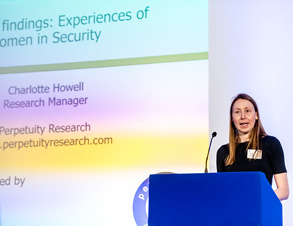It’s not only dick pics and sexual harassment, and being belittled and having blame shifted onto them – women in the security industry are facing unconscious bias from men, according to a survey of security women’s experience by Perpetuity Research. That was set out by Charlotte Howell of Perpetuity as the final speaker of the OSPAs thought leadership summit in London yesterday afternoon, before the UK OSPAs awards in the evening, at the Royal Lancaster Hotel in W2.
The research findings from women in security who responded to a Perpetuity survey are free to download on the Perpetuity Research website; and the March 2020 print edition of Professional Security carried a digest.
As Charlotte, pictured, told the summit, women respondents felt that security lags behind other sectors in their treatment of women doing the jobs, compared with (say) the police. Bias against women can be self-fulfilling, she suggested. If security recruiters tend to hire people who (like themselves, perhaps) have police or military experience, and far more men than women are in the military and police, then private security will continue to be a mainly male industry. If security teams regard women as only able to do ‘female’ tasks, not the more exciting, challenging and physical jobs, then women won’t find the same opportunities to progress in their careers.
Perpetuity plan for their next project in the Security Research Initiative (SRI) to look into that subject of careers, whether people enter private security as a first career, or as a second; what brings them in, and what makes them stay?
As Charlotte told the event, women respondents made the point that they could do security just as well as men; although they might find that they had to try and work twice as hard as men, and any falling short by a woman would be given less leeway, compared with a man. That said, many women liked their work and the sector, and put forward ideas to promote security as a workplace for women – because, as they said, security does not have to be about being physically imposing.
How then to promote security for women? Charlotte described some of the women’s responses. Address working practices; management should offer more support. On recruiting, she suggested use of ‘blind CVs’, and a look at the language in job adverts, whether saying ‘he’ and ‘him’ or less obviously using words that implied the man for the job had to be a … man. And attitudes had to be challenged, whether women were put down verbally, or were expected to be the ones to make the coffee. And the sector should be more open and transparent about career progression – to clarify how women can (or cannot) progress.
Women respondents had acknowledged that security work can mean long hours, and shifts can be a problem for those looking after children; but there are still things that can be done, Charlotte suggested, such as split or shorter shifts, or at least consistent hours of working, to allow women (or indeed anyone) to also be a care-giver, rather than rotating shifts.
Women were not asking for special treatment, Charlotte said in summing up; what they were asking for was barriers to be removed. And if employers did remove those barriers, it would be beneficial for all staff, not just women.
Photo courtesy of the Ospas. Visit https://uk.theospas.com/summit2020/.









